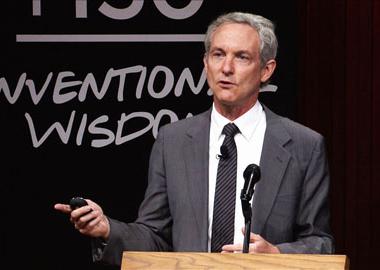 It’s Day 95 in MIT’s 150 days of sesquicentennial celebration, and all thoughts turn to the evolution of computer science and MIT’s pivotal role in that history. As Victor Zue puts it so succinctly, “Computers sure have changed.” They are even invading biology, and President Hockfield (who is also a Professor of Neuroscience) sees this history as another branch in the tradition, initiated by William Barton Rogers, of education bringing the “useful arts” (or as we now say, technology) to bear on the economic development of the United States.
It’s Day 95 in MIT’s 150 days of sesquicentennial celebration, and all thoughts turn to the evolution of computer science and MIT’s pivotal role in that history. As Victor Zue puts it so succinctly, “Computers sure have changed.” They are even invading biology, and President Hockfield (who is also a Professor of Neuroscience) sees this history as another branch in the tradition, initiated by William Barton Rogers, of education bringing the “useful arts” (or as we now say, technology) to bear on the economic development of the United States. Tom Leighton asserts that “To say computers are transforming everything is an understatement.” Leighton offers a brief lesson in theoretical computer science, defining an algorithm through the example of searching for the prime factors of a given number N, and identifying the key follow-up questions: Can you prove it works? How long does it take? How good is it? Then the big question: Does theoretical computer science matter? Leighton cites some powerful examples of the field’s impact on our lives, from encryption to Google’s page-rank algorithm to the content delivery system of
Akamai Technologies (which he co-founded in 1998).
Ed Lazowska asks a very different question: What four important events happened in 1969? If you guess the landing on the moon, the Woodstock festival, or the Mets winning the World Series, you’re right but no cigar: the most important event was the first data transmission over the ARPANet, forerunner of the Internet. Since then, relentless innovation has produced computer systems that make possible digital media, mobility, search – and set the stage for the next generation of smarts, i.e., computers embodied in our homes, cars, healthcare, and in a sense, ourselves, via crowd-sourcing. In all this, even when viewed from the “left coast,” MIT’s role continues to be central.
But the rock star of this symposium is actually IBM’s Jeopardy-winning Watson, whose glowing blue countenance beams in all three talks. Patrick Winston takes off from Watson to look for the beginning of artificial intelligence, and after a few hops backward through the late 20th century, arrives at Aristotle and then Neanderthals and the paintings at Lascaux. The modern progenitors of artificial intelligence, whom Winston honors one-by-one in a digital photo gallery, include Marvin Minsky (for focusing on human cognition), Roger Schank (storytelling), and David Marr (layers of explanation).
Where is artificial intelligence headed? Winston is working on a “trinity of strong hypotheses” – about story, perception, and social interaction – and he promises to report on the success of this way forward at the MIT bicentennial celebration....Read the full article/Watch Video
Ed Lazowska asks a very different question: What four important events happened in 1969? If you guess the landing on the moon, the Woodstock festival, or the Mets winning the World Series, you’re right but no cigar: the most important event was the first data transmission over the ARPANet, forerunner of the Internet. Since then, relentless innovation has produced computer systems that make possible digital media, mobility, search – and set the stage for the next generation of smarts, i.e., computers embodied in our homes, cars, healthcare, and in a sense, ourselves, via crowd-sourcing. In all this, even when viewed from the “left coast,” MIT’s role continues to be central.
But the rock star of this symposium is actually IBM’s Jeopardy-winning Watson, whose glowing blue countenance beams in all three talks. Patrick Winston takes off from Watson to look for the beginning of artificial intelligence, and after a few hops backward through the late 20th century, arrives at Aristotle and then Neanderthals and the paintings at Lascaux. The modern progenitors of artificial intelligence, whom Winston honors one-by-one in a digital photo gallery, include Marvin Minsky (for focusing on human cognition), Roger Schank (storytelling), and David Marr (layers of explanation).
Where is artificial intelligence headed? Winston is working on a “trinity of strong hypotheses” – about story, perception, and social interaction – and he promises to report on the success of this way forward at the MIT bicentennial celebration....Read the full article/Watch Video
For more techical information visit our sister website www.engineeringmaintenance.info or for equipment procurement please visit www.engineeringtrader.com

